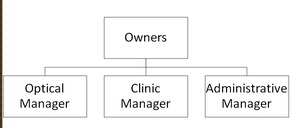By Beverly Jue-Smith, OD, MBA
Oct. 14, 2015
SYNOPSIS
Your optical provides two-thirds of your practice revenues. Having a dedicated optical manager—and equipping them for success–can accelerate growth in this vital area.
ACTION POINTS
APPOINT OR HIRE OPTICAL MANAGER. Five-to-10 years of experience and optical and managerial ability to manage others needed.
GIVE OPTICAL MANAGER AUTONOMY. Give majority of staff management and vendor rep meetings to optical manager to manage on her own.
GIVE OPTICAL MANAGER DEVELOPMENT OPPORTUNITIES. Consider funding additional professional certifications and other continuing education.
The optical is usually the area of the practice that generates the most revenues. It’s too important a part of the practice to leave its operations to chance. Our five-OD practice, with a support staff of 18, and around 7,500 comprehensive exams delivered annually, has assigned a manager to oversee optical operations.
Do the Math Before Making the Hire
When hiring an optical manager, consider two factors:the cost of a new employee vs. the added productivity they can provide. TheManagement & Business Academy (MBA) offers very helpful salary guidelines. On average, anoffice manager earns about $43,000 a year vs.$36,000 for a lab manager and $34,000 for an optician (the salary of an optical manager is not specifically tracked by the MBA). Now factor in revenues.A comprehensive exam generates, on average, $306 in practice revenues, also according to the MBA. This means that to cover a new hire at about $40,000 a year once you begin to factor in benefits, you need to generate about 130additional comprehensive exams, or roughly two more exams perday. First, does your practice have the capacity to handle two more exams and day, and hopefullymore?Second, does the person you hire holdthe potential to capture and build higher eyewear sales in the optical to more than cover their salary?
If hiringan optical manager does not make financial sense, you can appointan existing optician as optical manager. If the practice supports two or more full-time opticians, one of them should act as the “go to,” or managing, optician. You need someone on the floor who meets with frame reps and makes decisions on frame buying, problem jobs, and other challenges, while the doctor is in the exam room. The manager would also be working as an optician, but delegating and coordinating the work schedules and job assignments among the three opticians. The managers in our office still do the same “jobs” as the staff they manage.
Knowingwhen to add an optician depends on the ability of each optician, the number of exams perday, capture rate, how busy the practice is and how consistent the rate of patient flow into the office is. Sometimes hiring another doctor to generate the prescriptions is more effective than hiring an optician to try to generate more glasses sales with the current patient flow.
It is key to constantly watch the numbers, keep the optical staff well trained and analyze the buying habits of your patients.

San Ramon Family Optometry, Inc., hasthree departmental managers who are empowered to manage staff and make everyday decisions.
Designate Optical Manager & Optical Support Staff
As with most practices, more than 60 percent of our gross revenue comes from our optical department, so I needed an organized structure, including a dedicated person to be in charge of this area of the practice.
There are too many facets of it for me to manage on my own. Our practice has an optical manager who functions as our dedicated “go to” person for our optical department. This area of our practice demands a lot of attention from patients, doctors, frame reps, lab reps, and the rest of the staff. Except for the clinical area, the optical manager is involved in every aspect of the patient encounter.
In addition, we also have a staff member acting as our bench optician in charge of our in-house edging lab who reports to our optical manager. That person is in charge of ordering the finished lenses and uncuts, cutting the jobs, and making sure the jobs are cut on time and billed. Our optical manager makes sure that our bench optician has our in-house lab running smoothly.
Our optical manager assigns individual duties to the other opticians and makes the final decision on frame purchases. She is also in charge of relaying any information from the owners, the other managers, frame and lab reps to the other opticians. She trains new opticians, and is responsible for overseeing the entire dispensary area.
She also keeps track of the optician attendance records and creates their work schedules. She gives the opticians regular performance reviews and tracks their sales. She also meets with frame, lens and lab reps.

The structure of Dr. Jue-Smith’s practice. Three managers operate under the guidance of practice owners, with near autonomy in managing their respective areas of the practice.
Determine RequiredExperience, Set Salary
Our current optical manager has seven years of optician experience, and was the optical manager at a smaller practice before she came to our practice. I trained her in additional management skills, and we meet regularly to go over different topics, such as how I want her to handle various patient and staff challenges.
We have two other departmental managers in our practice, the clinic manager and the administrative manager. The clinical manager’s salary is in the $16-$20 range, but based on optometric practice salary surveys, the optical and administrative managers’ salary range is greater than the clinic manager’s since these positions require more responsibility. They also have larger staffs, and typically, more duties. I have seen salaries range up to $25/hour, or more, for optical managers.
Our optical manager is one of the top-level staff at our practice. If she takes the initiative to get an advanced Certified Optician certification such as Master Optician, she would be eligible for a salary raise. She is also eligible to dictate what her professional advancement path should be, and what she would like to negotiate as her reward for achieving her goals. I am always amenable to anyone who wants to advance themselves within the practice; the result would always be a positive step for our practice, as well.
Delegate Duties to Optical Manager
The optical manager spends much more time with our patients in the dispensary every day than I do, so she knows the demands of our clientele much better than me. I encourage her to come up with her own decisions as much as possible. Every month I meet with her to look over our inventory and sales reports and consult with our opticians to decide what frames we should purchase or discontinue.
I also give her a budget for purchasing frames, and she has full authority to purchase the frames. Since we go over this monthly, we can easily tweak or realign our inventory. We also go over on a weekly basis the changes needed in our optical department, and I ask her to originate solutions to problems that I might notice.
Have Optical Manager Manage Vendor Reps
The optical manager creates her own schedule to meet with frame, lens and lab vendors. I want our managers to have some autonomy as managers. I believe having that autonomy helps to build their self esteem, which, in turn, helps them want to do their best. I have trained her to look at our practice trends based on our statistics and reports, so she knows exactly what we are looking for. If there are any new products, we talk about it during our weekly optical department huddles.
Delegate Training and Management of Optical Staff
Our optical manager manages the opticians, but I encourage the administration manager and our clinic manager to have the authority to speak to staff who are not directly under their supervision about any practice issues when the need arises. I think it works better to have as many eyes on the practice as possible since I am in the exam room much of the time.
The optical manager also schedules each optician to take classes so each optician has an equal number of opportunities during the year. In addition, she schedules meetings with her staff and the vendors on a regular basis. She makes sure her staff is well trained, and that each optician is given the same written information.
My partner and I set the goals for each department of the practice. The managers’ job is to make sure their teams stay on target.
I believe it is extremely important to let our optical manager be as autonomous as possible. I encourage her to consult with me whenever she feels the need, and she knows that I will offer suggestions whenever she asks. I make sure I touch base with her as often as possible to ask her if she needs help with anything. I give her management tips whenever possible and teach her how to apply management principles so she can have a basis for her decisions. Most of all I let her know that I “have her back” when she makes mistakes. As owner of the practice, she knows I will support her.
Consider Adding Support Staff for Optical Manager
We have noticed a need for an assistant optical manager in our practice. We have also considered making the bench optician a manager in the future. I think these changes could help alleviate some of the extra duties our optical manager currently has, and could free her up to help me with other areas in the practice that need attention.
Beverly Jue-Smith, OD, MBA, is the owner of San Ramon Family Optometry, Inc., in San Ramon, Calif. Dr. Jue-Smith also is owner of Optometric Consultants, a private practice consulting firm. To contact her: srfoptometry_drb@yahoo.com



























